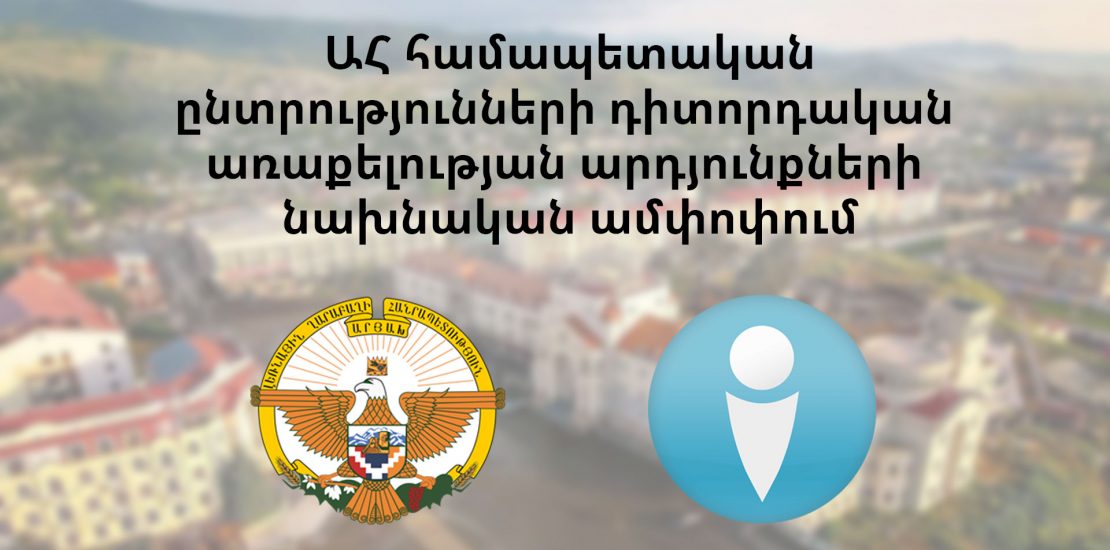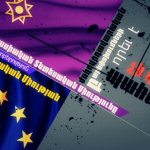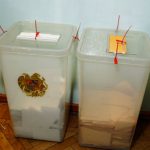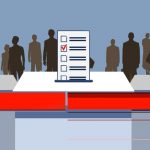- 1 April, 2020
- Elections

During the presidential and parliamentary elections held on March 31, 2020, the Stepanakert Office of the Union of Informed Citizens NGO conducted a short-term observation mission with a grant provided by the Office of the Prime Minister of Armenia.
There were 282 polling stations in the Republic of Artsakh. The Union of Informed Citizens observed 49 polling stations in Artsakh, and one in Yerevan. The observations were carried out in all 8 Territorial Electoral Commissions, as well as by 10 mobile groups of the mission. Both during the pre-election period and on the voting day, media monitoring and monitoring of law enforcement activities were conducted. 113 short-term observers, 5 lawyers, 9 telephone operators and about 25 administrative employees were involved in the mission.
Recorded violations
- In 16 of the 47 polling stations observed, there were persons present in the polling station who did not have the right to be in the polling station.
- More than one person entered the voting booth in 13 of the observed polling stations. According to observers, in some places, it was obviously a controlled voting. These observations do not include instances when the voters were accompanied by children and instances of helping voters to vote in accordance with the established procedure.
- The badge was not visibly worn in 15 polling stations, mainly by proxies, and in rare cases, by members of the Precinct Electoral Commission.
- Violations and remarks were not recorded or were not always recorded in the register in 12 of the observed polling stations.
- Instances of voters explicitly saying who they voted for were recorded in 9 of the observed polling stations. Instances of filling out ballot papers outside the voting booth were registered in 40 polling stations. In 20 of the mentioned polling stations the phenomenon was observed more frequently. In total, about 700 cases were registered, mostly observed among the elderly.
- Attempts to take the ballot paper out were registered in 2 polling stations. In one case, the voter tried to take the ballot paper out after the chairman of the commission did not allow him to take a photo of it. There were credible reports of ballots “carousel (a type of controlled voting) by other entities as well.
- In 9 of the 49 polling stations observed, observers recorded instances of voters taking photos of their own voted ballot papers. There have been numerous reports of such incidents by other actors, as evidenced by numerous videos on the Internet. Moreover, in none of these cases did the member of the commission turn to the police officer on duty at the polling station. Some of the chairmen of the commissions reported that they were instructed not to turn to the police in case they saw a voter taking a photo of the voted ballot paper.
- Accumulations were observed inside the polling station in 11 cases. Moreover, the accumulations in 4 polling stations were combined with the presence of persons without the right to be in the polling station, and in one polling station they were combined with the visit to one of the candidate’s headquarters immediately after the open voting.
- In 7 of the observed polling stations, the proxy tried to give instructions and orders to other persons. In one case, such a function was taken over by a media representative, in another case by a member of the commission, since the chairman of the commission and the other members did not know their functions.
- Quarrels (without use of physical violence) were registered in 10 polling stations, mainly with the participation of proxies, members of the commission, and related to the commission failing to eliminate violations.
- Organized transportation of voters was observed in the vicinity of 3 polling stations. In two cases, the transportation was organized, but did not have a systemic nature, in one case the transportation was continuous and was organized by Arayik Harutyunyan’s supporters.
- Accumulations of people in the vicinity of the polling station were observed in 33 of the observed polling stations, in 10 of which the police did not take sufficient measures to solve the issue. Six cases of accumulations were clearly related to the proxies of the candidates, three of which continued throughout the voting.
- In the case of one polling station, it was observed that the voters entered the polling station immediately after the visit to one of the candidate’s headquarters. In one polling station, there was a regular practice of going to the pre-election headquarters immediately after leaving the polling station.
- In 9 of the observed polling stations, the observers noted that the chairman of the commission had a limited knowledge of the procedure of summarizing the voting results, and in 1 polling station the chairman had no knowledge of it.
- According to observers, in 2 polling stations, the commission recorded unrealistic figures in the protocol to correct some inaccuracies or slightly changed the baseline figures.
Analysis of voting results
The polling stations to be permanently monitored by the Union of Informed Citizens observation mission were selected through sociological sampling, and if there was a falsification of the voting results in the polling stations left out of the monitoring, the average voting result of the observed polling stations would be different from the average result of the whole republic. In this regard, it should be noted that such a phenomenon was not observed. The maximum deviation of the percentage of votes received by the presidential candidates is 0.5%, for the parties and blocs it is 2.2%. This indicates that there were no massive falsifications of voting results in polling stations not observed by the observers of Union of Informed Citizens NGO.
At the same time, the correlation between the percentage of voter turnout in the polling stations and the percentage of votes received by presidential candidate Arayik Harutyunyan (to some extent also Vitaly Balasanyan) points to non-political mechanisms of exerting influence on the voters. This is usually due to an artificial increase in voter turnout or voter coercion.

Free expression of will of the voters
It should be emphasized that the Union of Informed Citizens did not conduct a long-term observation mission. However, a long-term observation mission was conducted by our partner “Akanates” observation alliance, which raised concerns about the use of administrative resources and charity during the campaign process. Many individuals have also alerted us about charity activities during the election campaign and associated with certain candidates. These circumstances give grounds to think that there was exertion of influence on the will of the voters prohibited by law.
Key factors in the influence of the aforementioned phenomena on the voting results are the numerous issues related to following the principle of secret ballot in the polling stations. In particular, this leads to deep concerns in light of the circumstances that instances of taking photos of the voted ballot papers by the voters were of regular and massive nature, the chairmen of the precinct electoral commissions did not respectively turn to the police officers (apparently following the relevant instructions), and that months ago the authorities of Artsakh resisted the proposal to amend the controversial article on violating the secrecy of the ballot in the Criminal Code of the Republic of Artsakh.
Given the fact that photographing one’s own ballot, as well as other expressions of violation of the secrecy of the ballot, is of a latent nature, as a rule, in rare cases observed by observers, we can assume that these cases were much more than observed by our observers and by other entities. However, their number cannot be accurately estimated. Accordingly, it is impossible to give an exact quantitative assessment of the percentage of voters in the Republic of Artsakh who, being constrained by the charity they received or the administrative levers applied to them, were not able to express their real will in the voting booths.
Union of Informed Citizens


 Հայ
Հայ Рус
Рус


